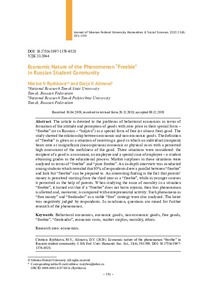Economic Nature of the Phenomenon “Reebie” in Russian Student Community
Скачать файл:
URI (для ссылок/цитирований):
https://elib.sfu-kras.ru/handle/2311/128397Автор:
Ryzhkova, Marina V.
Alimova, Darja V.
Рыжкова, М.В.
Алимова, Д.В.
Дата:
2019-12Журнал:
Журнал Сибирского федерального университета. Гуманитарные науки. Journal of Siberian Federal University. Humanities & Social Sciences;2019Аннотация:
The article is devoted to the problems of behavioral economics in terms of formation
of the attitude and perception of goods with zero price in their special form – “freebie”
(or in Russian – “haljava”) as a special form of free (or almost free) good. The study
showed the relationship between economic and non-economic goods. The definition
of “freebie” is given as a situation of receiving a good in which an individual (recipient)
bears zero or insignificant (inconspicuous) economic or physical costs with a perceived
high assessment of the usefulness of the good. Three situations were considered: the
recipient of a good is a consumer, an employee and a special case of employee – a student
obtaining grades in the educational process. Market surpluses in these situations were
analyzed in terms of “freebie” and “pure freebie”. An in-depth interview was conducted
among students which revealed that 95% of respondents drew a parallel between “freebie”
and luck but “freebie” can be prepared to. An interesting finding is the fact that parents’
money is perceived starting from the third year as a “freebie”, while in younger courses
it perceived as the help of parents. When studying the issue of morality in a situation
“freebie”, it turned out that if a “freebie” does not harm anyone, then this phenomenon
is allowed and, moreover, is compared with entrepreneurial activity. Such phenomena as
“free money” and “freeloader” as a stable “free” strategy were also analyzed. The latter
was negatively judged by respondents. In conclusion, questions are raised for further
research of the phenomenon Статья посвящена проблемам поведенческой экономики в части изучения особенностей
социально-экономических отношений, возникающих в случае товаров с нулевой
ценой в их особой форме – «халяве», – как особой форме бесплатного (или почти
бесплатного) получения товара. Исследование показало связь между экономическими
и неэкономическими товарами. Дано определение понятию «халява» – ситуация
получения товара, при которой физическое лицо (получатель) несет нулевые или
незначительные экономические или физические издержки при высокой оценке полезности
товара. Были рассмотрены три ситуации: получателем товара является потребитель,
работник и особый случай работника – студент, получающий оценки в учебном
процессе. Рыночные излишки в этих ситуациях анализированы в терминах «халява»
и «чистая халява». Было проведено глубинное интервью среди студентов, которое
показало, что 95 % респондентов проводят параллель между «халявой» и удачей,
но «халява» может быть подготовлена. Интересным фактом является то, что деньги
родителей с третьего курса воспринимаются студентами как «халява», а на младших
курсах – как помощь. При изучении вопроса о морали в ситуации «халява» выяснено,
что если «халява» никому не причиняет вреда, то это явление допускается и, более того,
сравнивается с предпринимательской деятельностью. Были также проанализированы
такие явления, как «свободные деньги» и «халявщик» как стабильная стратегия поиска
бесплатных товаров. Последний вариант был отрицательно оценен респондентами.
В заключении даны возможные дальнейшие направления исследования этого
явления
Коллекции:
Метаданные:
Показать полную информациюСвязанные материалы
Показаны похожие ресурсы по названию, автору или тематике.
-
Institutional Analysis of the System of Public Interactions in the Region’s Economy to Provide for the Infrastructure of the Population Living Conditions and Quality of Life
Rutskiy, Vladislav N.; Руцкий, В.Н. (Сибирский федеральный университет. Siberian Federal University., 2016-11)The article analyzes the institutional system of public interactions of the region’s population and state authority and administration bodies as the system of provision of infrastructure for population living conditions ... -
Инфраструктура жизнедеятельности населения в контексте качественного экономического роста
Пыжев, И.С.; Pyzhov, Igor S.; Руцкий, В.Н.; Rutskiy, Vladislav N.; Горячев, В.П.; Goryachev, Vadim P. (Сибирский федеральный университет. Siberian Federal University., 2011-12)On the basis of system-evolutionary paradigm and principles of neo-institutional economic theory an approach to system-reproduction and institutional analysis of infrastructure for population living conditions is developed. ... -
Исследование институциональной среды посредством экономического анализа нормативных актов на примере инфраструктуры жизнедеятельности населения
Пыжев, И.С.; Pyzhev, Igor S.; Руцкий, В.Н.; Rutskiy, Vladislav N.; Таненкова, Е.Н.; Tanenkova, Ekaterina N.; Устюгова, Н.В.; Ustyugova, Nadezhda V. (Сибирский федеральный университет. Siberian Federal University., 2012-10)In the paper research on the institutional environment of infrastructure is carried out on the example of transportation and architectural complexes of infrastructure for population living conditions of the Krasnoyarsk ... -
The Technology of Forming A Future Specialist’s Basic Economic Culture
Marina, Georgiyevna Sergeeva; Natalia, Leonidovna Sokolova; Lyudmila, Zhalalovna Karavanova; Lyudmila, Nikolaevna Hramova; Tatiana, Gennadyevna Stanchuliak; Vera, Viktorovna Kolchina; Lyudmila, Petrovna Lobacheva (2020-02)Despite a significant role of a society’s economic culture and a worker’s personality in the life of the society, an enterprise or another person, the problem of forming economic culture is underdeveloped in pedagogic and ... -
The Model of Innovation Development Metasystem
Batukova Louise; Bagdasaryan Naira; Belyakova Galina; Vladimirova Olga; Belyakov Sergey (SOC ROMANA PENTRU ASIGURAREA CALITATII, BUCHAREST, 2019)Different fields of science from philosophy and institutional theory to theories of management, technological development and economics explore innovative transformations - mainly in terms of technical and institutional ...

